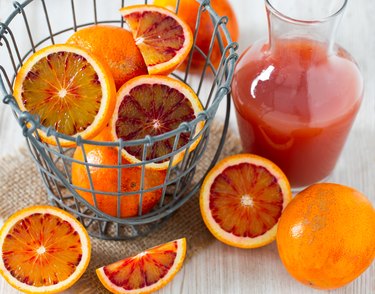
Juice from concentrate is a staple item in many homes because of its small footprint and low price compared to freshly squeezed juice. Simply store it in your freezer until you're ready to drink it, mix in some water, and you have a pitcher full of juice. The term "concentrate" simply means that the water has been extracted from the fruit. Juice from concentrate can be just as healthy as other fruit juice choices out there, assuming you go with the 100 percent fruit juice varieties.
Tip
Yes. Juice from concentrate without any added sugar is as healthy as 100 percent fresh fruit juice.
Video of the Day
Juice vs. Whole Fruits
The U.S. Department of Agriculture recommends consuming 1 to 2.5 cups of fruits per day, depending upon your age and gender. Young girls should aim for the lower end, while adult males need a higher quantity each day. If you drink 100 percent fruit juice from concentrate with no additives or preservatives, you can get all of the vitamins and minerals found in an orange from drinking orange juice, for example. There may be slight differences in fiber content, however, with whole fruit containing a higher concentration.
Video of the Day
Nutritional Value
The nutritional value of concentrated fruit juices varies, depending upon the type of juice and whether or not there are any additives, such as sugars, contained in the concentrate. A 1-cup serving of frozen apple juice concentrate contains 110 calories, 28 g of carbohydrates, 27 g of sugar, 270 mg of potassium and 72 mg of vitamin C, according to the U.S. Department of Agriculture's Nutrient Database. A serving of orange juice from concentrate contains nearly identical values, with the main exception of having 84 mg of vitamin C. Other fruit juices, such as grape and pomegranate, offer similarly high levels of vitamins and nutrients.
Health Benefits
Drinking 100 percent fruit juice — whether from concentrate or freshly squeezed — offers many health benefits due to the high concentrations of vitamins and minerals. For example, the potassium found in fruit juice helps to lower blood pressure. Vitamin C can help improve your body's ability to heal cuts and bruises, and vitamin A is good for the health of your skin and eyes. Frozen juice from concentrate also supplies your body with a relatively large amount of water per serving to help keep you hydrated.
Considerations
When choosing juice from concentrate at your local grocery store, it's important to read the label to be sure it does not contain added sugars like high-fructose corn syrup or other high-calorie additives. Any label that reads "Punch" or "Beverage" instead of "100 percent juice from concentrate" will contain additives and preservatives. Adding sugar to juice can greatly increase the number of calories per serving, considering 1 tsp. of sugar contains 16 calories, according to the USDA Nutrient Database. This turns a healthy drink into an unhealthy one.